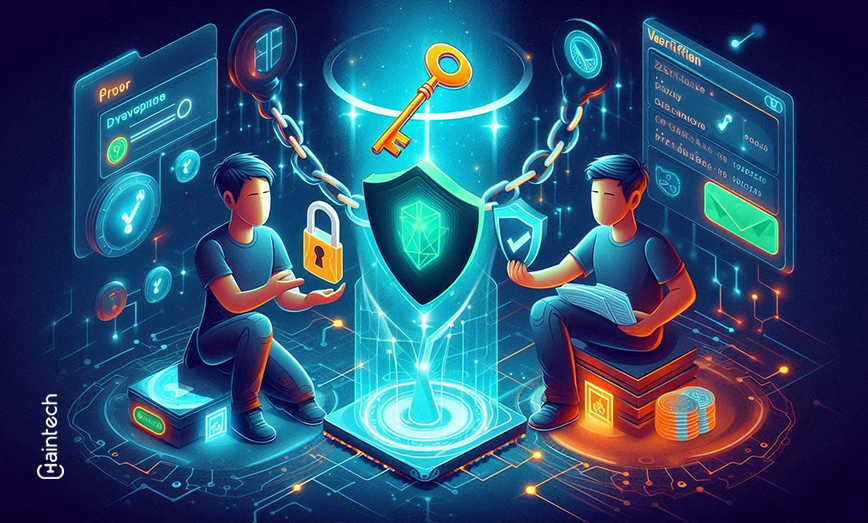What is Zero-knowledge proofs?

With rapid technological innovation, fraud risk has increased. Transaction security is crucial. Blockchain technology is promising, but security must be improved. Here come Zero-Knowledge Proofs (ZKPs).
Blockchain has always relied on cryptography. Zero-Knowledge Proofs have gained popularity as a means to secure blockchain transactions. ZKPs secure and anonymize blockchain transactions using cryptography.
A Zero-Knowledge Proof (ZKP) lets one party prove they know a value (like a secret key) without exposing it. Therefore, when validating information is important but releasing it is not, this idea is crucial. For example, in financial transactions, a ZKP can verify legitimacy without giving specifics.
The combination of blockchain and ZKPs makes transactions secure. Blockchain systems can increase security and privacy with these cryptographic methods. This keeps transactions secure and confidential, protecting user data.
Zero-Knowledge Proofs advance cryptography and blockchain technology. They improve transaction security and privacy, meeting the growing requirement for digital security. ZKPs can make blockchain networks more secure and private for financial transactions, boosting user trust.
What is Zero-knowledge proofs?
A cryptographic technique called Zero-Knowledge Proof (ZKP) allows one party (the prover) to prove to another (the verifier) that they know a given value without revealing any other information. In other words, it allows verification without disclosure.
For instance, ZKP allows the prover to prove they know a password without sharing it. Moreover, cryptographic protocols ensure three crucial qualities in this process:
Completeness:
This ensures that the prover’s proof will convince the verifier if the proposition is true. If the prover knows the secret information, the verifier can verify it and let them proceed with the transaction.
Soundness:
Soundness ensures that the verifier will not be deceived if the statement is false. A dishonest prover without the hidden knowledge cannot persuade the verifier of their bogus claim.
Zero-Knowledge:
The zero-knowledge property assures the verifier only knows the statement is true. Verification does not reveal the prover or hidden information. Data privacy and security are maintained.
History of Zero-knowledge proofs
- In 1985, MIT academics Shafi Goldwasser, Silvio Micali, and Charles Rackoff published “The Knowledge Complexity of Interactive Proof Systems” that launched Zero-Knowledge Proofs (ZKPs). This fundamental study introduced zero-knowledge proofs, launching a new cryptographic field. An interactive proof (IP) hierarchy and knowledge complexity, which assesses how much information is passed from prover to verifier, were introduced in the study. The first zero-knowledge proof for a specific problem showed practical uses for these notions.
- Another notable study was “The Knowledge Complexity of Interactive Proof Systems” by Goldwasser, Micali, and Rackoff in 1989. This study examined knowledge complexity and showed how zero-knowledge proofs could reduce the information a prover must divulge to a verifier to prove a statement’s validity. As a result, ZKPs in interactive proof systems were better understood and implemented after this.
- Arthur-Merlin Games was introduced in 1993 by Chicago and Budapest academics in “Arthur-Merlin Games: A Randomised Proof System and a Hierarchy of Complexity Classes.” This study used a combinatorial game between Arthur, who makes random movements, and Merlin, who makes optimal moves, to integrate zero-knowledge proofs with proof theory. This method connected complexity theory and zero-knowledge proofs. The authors won the 1993 Gödel Prize in theoretical computer science for the original zk work and Arthur-Merlin publication.
- “Succinct Non-Interactive Zero Knowledge for a von Neumann Architecture,” by Eli Ben-Sasson, Alessandro Chiesa, Daniel Genkin, Eran Tromer, and Madars Virza, introduced zk-SNARKs in 2013. A zero-knowledge proof, Zk-SNARKs can be verified with minimum computational resources, making them useful for secure and private computation verification.
- In 2018, the authors released “Scalable, Transparent, and Post-Quantum Secure Computational Integrity,” which introduced zk-STARKs. While scalable and transparent, this approach provides strong security assurances to overcome the constraints of zero-knowledge proofs. Zek-STARKs represent complex computing issues using a new mathematical construct called a polynomial constraint system (PCS).
Advanced zero-knowledge proof applications for scaling blockchain technologies and improving cryptographic security have resulted from these seminal studies. In a digital age, secure, efficient, and private transaction techniques fuel ZKP progress.
How do zero-knowledge proofs work?
Zero-knowledge proofs (ZKPs) let a prover demonstrate that a proposition is true without exposing additional information. In essence, they provide a proof, or a small piece of information, that a verifier can use to confirm the statement’s truth.
For example, bank customers may want to establish their identification without providing personal information like their social security number. In this case, a zero-knowledge proof of identification (ZKPI) can be employed. This scenario involves the consumer proving their identity and the bank verifying it. Instead of revealing sensitive details, the customer provides the bank with a government-issued ID. Consequently, the bank can verify the customer’s identity without disclosing sensitive information.
Similarly, electronic voting technologies enable voters to ensure their vote is counted without revealing their chosen candidate. In this context, evidence such as a digital signature can be confirmed by the voting system without exposing the vote itself.
Ultimately, the prover provides a proof that the verifier can verify without giving away any extra information about the assertion, such as the customer’s personal information or the voter’s choice.
Features of Zero-knowledge proofs
Zero-knowledge proofs (ZKPs) have unique properties that make them useful in many situations. Here are some major elements :
1. Privacy and Security
ZKPs verify data without revealing it. This means you can prove something without explaining why. For sensitive information like financial transactions or personal identification, this level of privacy and security is essential.
2. Compliance
ZKPs assist organisations in complying with data privacy rules. They are ideal for safe and private identity verification, ensuring KYC and AML compliance without compromising sensitive data.
3. Scalability
ZKPs improve blockchain network scalability by verifying transactions without giving data. This decreases blockchain data storage, improving network efficiency and transaction capacity.
4. Interoperability
ZKPs provide secure, private information transfer across blockchain networks. Interoperability allows blockchain systems to share data securely and privately.
5. ID Verification
ZKPs verify identities securely and privately. This helps users verify their identity without providing critical personal information, maintaining privacy and security.
Conclusion
In conclusion, zero-knowledge proofs (ZKPs) revolutionized cryptography. This strong notion enables secure and private exchanges between parties, proving information’s veracity without revealing it. Furthermore, ZKPs have several uses and could change internet communication.
As security and privacy are more important than ever, especially as the digital world becomes more intertwined with our lives, ZKPs protect sensitive data and secure transactions to meet these objectives. For instance, they are useful in financial transactions, identity verification, and regulatory compliance, where confidentiality and data integrity are crucial.
Additionally, their unique blend of security, privacy, and efficiency makes them essential for protecting sensitive data and enabling secure digital interactions. Therefore, ZKPs will certainly become more important and useful as technology advances, changing digital security and privacy.









